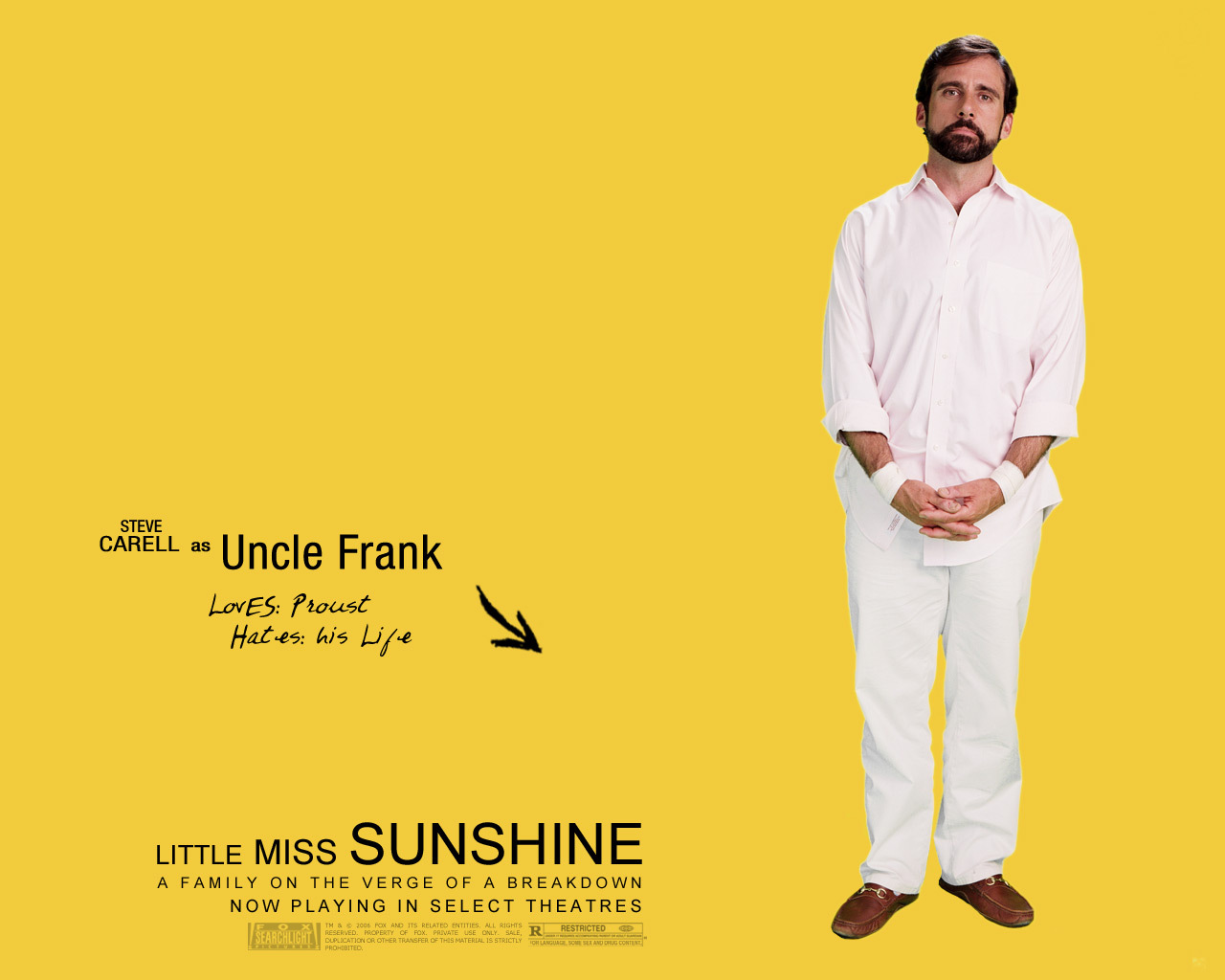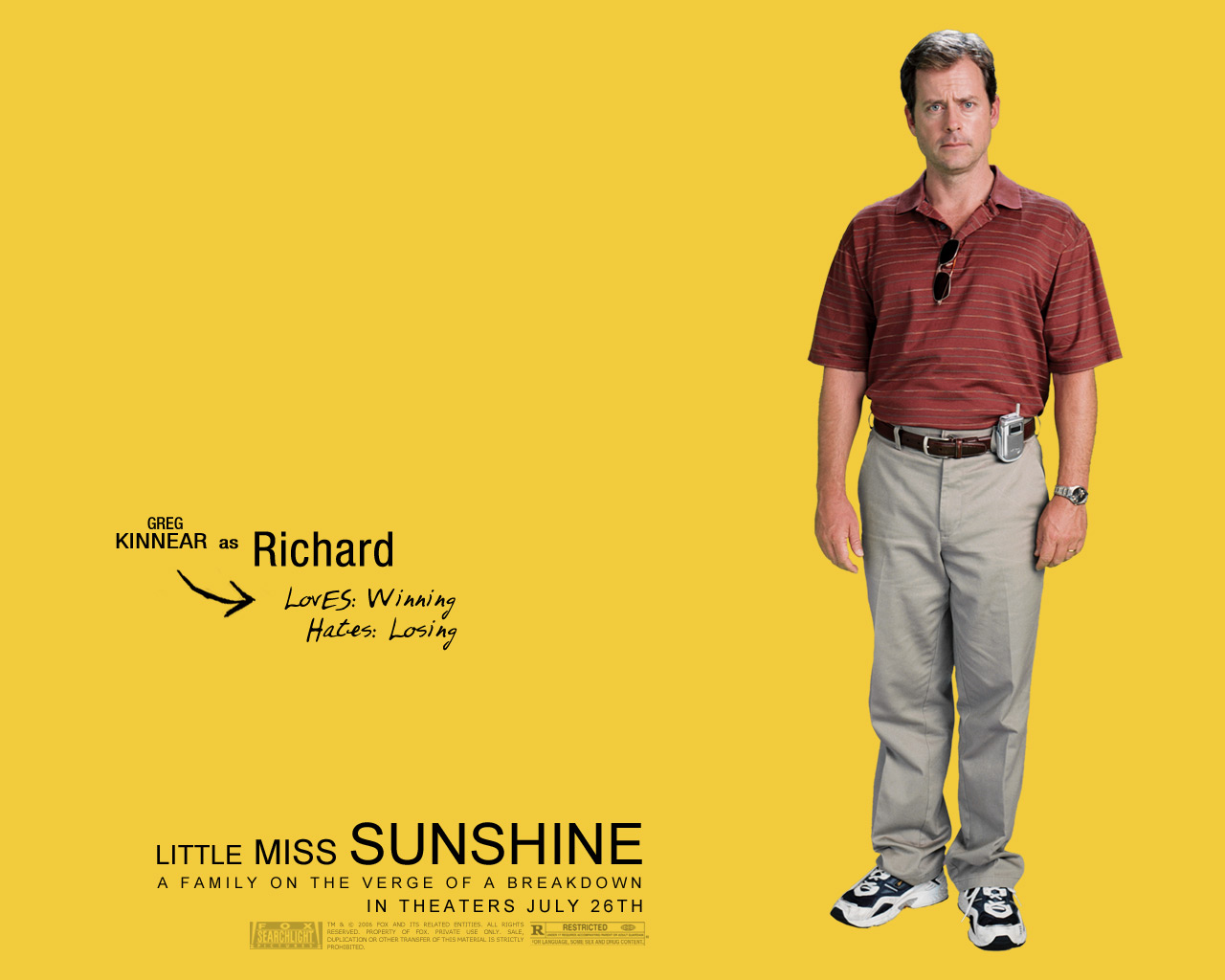Little Miss Sunshine or Little Miss Psychological Dysfunction

In this silly, cinematic adventure of Little Miss Sunshine, many of the main characters are experiencing an array of psychological disorder. Although a comedy, one could argue the darkly humorous film addresses various mental illnesses within the disaster-filled road trip of the Hoover family. The father could be seen as a diagnosable narcissist or could quite possibly have a twinge of Ego Integrity vs. Despair stage of Erikson. The Uncle, who tried to take his own life, is possibly a victim of depression or an acute anxiety disorder. Even the son and grandfather foster surmountable psychological problems and addictions throughout the course of the film.
Richard
Richard Hoover, played by Greg Kinnear, is a great example of a narcissist. He inherently reverts back to his own self-centered ideology during the family’s journey. He goes back to this not only as if no one else’s point of view matters but as if no one else’s point of view exists in the rational world. This could also support the conclusion he suffers from Erikson’s Ego Integrity vs. Despair and has a quite heavy amount of cognitive dissonance. It is clear that Richard sways from both a mindset of severe emotional regret and an overly inflated sense of satisfaction from what has recently transpired in his life. He struggles with this inability to cope and furthermore is unable to accept what life means without a his quasi-successful career.
Although slightly redeeming in the end, Richard spends most of the movie as that one character the audience just can’t stand. A most representative example of that is when he tries to guilt young Olive into not eating ice cream because “skinny beauty queens don’t eat ice cream”. After this, Olive becomes self conscious of her weight as just a young, seven year old girl. His narcissism and need for attention overshadows his ability to empathize and offers little productive support for the rest of his family. In order for his character to actually have a narcissistic disorder it must be deviant, distressful and dysfunctional. He deviates from others, it therefore causes him distress and it creates dysfunction not just for him but also for the relationships in his life.
Richard truly deviates from the family in his selfish endeavors and ideas, he causes distress and annoyance every time he attempts to demonstrate his intelligence or power and he may have even caused permanent dysfunction for not only himself but also his daughter. In this day and age, Olive is already predisposed by the media to develop a mild form of body dysmorphia and this could statistically contribute to an eating disorder in the long run. He simply adds fuel to the fire of a young girl’s self destructive tendency, not exactly a loving, fatherly vibe. Richard Hoover shows all the verifiable signs that he may possess some kind of Integrity vs. Despair and or a form of diagnosable narcissism and it is repeatedly expressed as the film progresses.
Frank

Uncle Frank is probably the most likable character of the movie and it could be said that the audience tends to sympathize with him greatly. Even though he starts the movie out on a severely negative experience and mindset, it could be argued that throughout the film he is perhaps a direct representation of the audience. His expressions and attitudes all reflect some deeper inkling of curiosity and empathy for most of the other characters in the movie. His patience runs thin for Richard and his destructive, arrogant nature yet even then he seems patient and willing to understand. He also mirrors the anxiety the audience may be feeling, however since he remains a character in the story, we see the affects of this anxiety rear its ugly head. He is frequently singled out as the ‘odd ball’ of the bunch, still aside from his depressive state and abnormal anxiety levels, he seems to have a hold on reality better than the rest of the mentally disturbed clan.
This particular character tells a tragic tale of love and life and this is what led him to make an attempt on his own life before the movie’s start. As a homosexual, this character is five times more likely than any given heterosexual to take his own life. This real life statistic stems from the stark amount of anxiety associated with being inherently rejected by society and the stress linked to finding a suitable partner.
Remaining arguably the most troubled of the group, one could say that Frank really does have the most compassion for his family. He also does not judge people prematurely. He is hyper-aware to not make fundamental attribution errors on the actions of others and continually creates an atmosphere of open-mindedness for the people that surround him. As more and more troubling events unfold, Frank is quick to attribute other’s behavior to their situation and not their essence of character. This makes him some sort of cinematic sage and and by the end of the film becomes an example of a real friend. The deep depression he suffers from is perhaps lightened by the support he is able to give to those around him.
Frank’s initial inability to successfully communicate with those around him supports the prognosis that he may feel abnormally isolated and therefore depressed. This could potentially also prove his depression causes his anxiety to heighten because the others around him are unable to comprehend him as he comprehends them. This lack of control is demonstrated through his outbursts and often sarcastic form of dealing with the shortcomings of others.

This film plays on the emotions of the audience and forces one to look at the dysfunction they may be currently suffering. Little Miss Sunshine, although not necessarily ‘happy go lucky’, is a helpful and entertaining reminder that life’s problems can often manifest themselves in our relationships and in our personalities. It’s satirical undertones carry a heavier message for the awareness of mental illness and distress. This deeply psychological, major motion picture has definitely earned a more existential meaning than just another comedy.
What do you think? Leave a comment.












My mother had been raving about this movie for the longest time.
The outcome of the movie made me happy, because I didn’t think the Hoovers were a close family, but the ending proved me wrong!
I just realized that three of my favorite films ever (Eternal Sunshine of the Spotless Mind, Broken Flowers and this one) come from a three-year period. And I’ve been watching movies since the 1960s. You would think 2004/2006 was a golden period in the history of movies -yet I feel there was a whole lot of crap too, these three were just jewels in the mud.
I didn’t really get what this movie was about at all until the end. It is a simile for life, relationships and family i.e. we annoy each other, fight, have our internal and external problems but in the end its still family.
I can’t say I liked the movie, but I can sure support the messages it was conveying
Sounds like an authentic movie.
I did find it funny but disturbing and a rather sad commentary on the American family.
This is, hands down, my favorite movie of all time. I stumbled upon this one day on Comedy Central and instantly fell in love. After it ended, I immediately watched it again without the annoyance of commercial interruptions or censorship. No other movie has ever been able to make me laugh so much or cry so hard in such a short amount of time.
It was very difficult for me to watch it until the end.
I wasn’t quite sure what to make of this film; many of the main characters are hard to like at first and they are all a bit odd.
The dynamic of this family is truly something to behold.
This was an interesting movie to watch. It depicted the journey a dysfunctional family makes rather well.
I liked this movie not only because of the plot which I found really great but also for the messages that we can take from this movie.
This is a very strongly written, superbly executed comedy!
I really went into this movie thinking it was gonna suck, but i was more than pleasantly surprised. You can see from the first 5 minutes that this is a rather hard movie besides from the fact that it is about a little girl who want’s to win a beauty pageant.
This is just a fabulous film!
You won’t find a whole lot better in this field.
I couldn’t enjoy the movie for these many reasons, although the acting was good on everyone’s part.
The most funny scene is when a police stopped them and they had a dead body in their trunk, hilarious.
“Little Miss Sunshine” is a great movie from which we can gain many things and we can think many of those after we watch it.
amazing film full of emotions.
Really interesting take on a classic indy flick. Thanks for the good read.
This is my favourite movie, for so many reasons. It somehow exerts so much light with, simultaneously, a lot of darkness. The ending is somewhat bittersweet; the dysfunction of the family is what bring ultimately brings them together.
Good summary of Little Miss Sunshine, and it’s characters neuroses. But you forgot to deal with the self chosen mute Nietzsche fan, who wants to fly jets, or the sex obsessed grandfather played by Alan Arkin.
hah thanks! So true, felt like I’d end up writing a book if I dove into EVERY characters’ issues. Such a complex story filled with a whole slew complexes.
Not to mention the potential eating disorder / body dysmorphia that can be attributed to being a not-so-skinny, unaverage girl in a beauty pageant!
This is definitely in my top 10 films to watch. The best scene for me was Dwayne’s meltdown when he realised he couldn’t fly jets because he was colourblind – I found this so emotional. It seemed like such a small thing in comparison to the other events in the movie but it’s something everyone can relate to, because we all have dreams that we want to achieve.
Great article, great film – thanks for dissecting it!
Both this movie and “The Way Way Back”, made by the same producers, deal with strong themes of mental health in suburban American families. We’ve grown up in a society of the picket-fence family ideal. However, the reality is that no family, no matter how they look, are perfect. “Little Miss Sunshine” is a great example of a deconstruction of that.
For some reason, probably based on praise from friends who saw this movie, I expected I’d enjoy it: That was not the case. This is not one of those movies I’d like to see a second time.
Typical. Is it inherent mental illness or the disasters that produce “mental dysfunction” in the characters? Is it mental illness at all? Mental illness has little to do with the message of this movie.
“Life is one big f****n beauty contest”. We have only to look at social media for that obvious “dysfunction” in society. It is the disasters that show the characters/audience of the film how unrealistic it is to compartmentalize life as being a loser or winner. Life is full of unanticipated nightmares and events. People need to look at context before making assumptions about others. “He is in bed all day watching television, what a loser.” Context. He is seriously depressed because his disability prevents him from working in his profession. He volunteers a few hours a week at the food bank. What a loser, eh?
Messed up the quote. “Life is one f*****n beauty contest after another”. Dwayne (Paul Dano)
It was a bittersweet family movie with its heart in the right place. Unfortunately, these days we are too quick to classify various human quirks into mental illnesses.